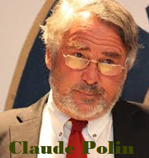The way of civilization is paved with the recumbent gravestones of dead religions. How is it, then, that Marxism, which meets most if not all of the qualifications necessary for religious designation, survives after nearly two centuries of false prophecies, failures, and a history of enormous atrocities? Two years ago, as the editor of Chronicles: A Magazine of Culture, I published a brilliant essay by the late  Claude Polin, Emeritus Professor of Political Philosophy from the Sorbonne, that tackles this difficult question (“Marxism: Why the Liberal West Can’t Avoid It,” June 2018).
Claude Polin, Emeritus Professor of Political Philosophy from the Sorbonne, that tackles this difficult question (“Marxism: Why the Liberal West Can’t Avoid It,” June 2018).
Polin begins by observing that no one doubts that Marxism has passed its zenith and is destined for the oft-invoked dustbin of history. And yet, he adds, Marxism has clearly not been “erased” from the Western mind. “It is not,” he writes, “so much that a few communist parties linger here and there; it is, much more decisively, that Marxism has not stopped hovering over significant parts of our intelligentsia and our Western youth, who seem rather fascinated by the Marxist rhetoric, not to mention the surprising number who regret Stalinism.” “Marxism” was Claude’s last published article; he died at his home in Paris two months after it appeared in print and before he could complete a complementary essay on the indispensability of Christianity and Christian thought to Western society, and a year and a half before the events of the first seven months of 2020 proved his thesis so spectacularly right.
Polin finds it strange that while regimes inspired by Marxist theories have been many times condemned, Marxist doctrine itself, like Marx himself, has never been “indicted.” Why, he asks, should that be so? Why has Marxism imprinted Western thought to the extent that it has? And why has communism never been put on public trial, as National Socialism was immediately after the defeat of the Third Reich? “Whatever the reason for Marxism’s survival, it is the reason for that reason that must be discovered….”

Marx’s sole goal was modernity, Polin says, which is also the West’s goal and ideal. The distinction between the liberal thinker or politician (or thinking politician) is that he cannot honor his promise, while Marx claimed he had found the way to assure that his promise would come true. “Marx is not an enemy of the liberals; he is the embodiment of a liberal who has managed to attain the goal he set himself.”
Yet Marx’s own promise is a sham. “Once the citizens have been declared each the owner of everything that’s worth owning —and first of all the instruments of production, the factories— then what happens?" The answer is that either the factories cease to function, or: “Things will go their natural way, and soon enough the comrade general will become much more of a general than a comrade. Little by little communism will slouch toward its most hateful state, that of a society that has lost all pretence of community.” Everyone feels himself his own sovereign, free to pursue happiness in his own way. The result is Western society as we are living it in the 21st century. Hence the relationship between Marxist societies and liberal ones, Polin argues. “Wherever you have one, you have the other, for the simple reason that liberalism naturally fosters the notion that it cannot satisfy what Marxism claims to be able to fulfill.”
“Conceited” Western governments felt, and continue to feel, confident that their disgruntled, bitter, and “underprivileged” citizens will learn from the failure of communist societies and make their peace with the liberal ones whose citizens they are. Yet “it is of the essence,” Polin observes, “of the Marxist dream to attract dreamers…. Marx is the unholy ghost of the modern West and will continue to haunt it as long as the West strives to be modern, i.e., to deliver promises whose infantilism is matched only by the sheer nonsense of Marx’s supposed remedy — a twin set of intellectual flaws that don’t seem to bother too many of our contemporaries, erudite or not.”
Claude Polin saw that the sole way for the West to get out from under Marxism for good and all is for it to rediscover and re-embrace the truths that “man must understand the world and his place in it, rather than try to recreate a world in which everyone may live according to his impulses.” It must recognize that the Dark Angel’s promise “Ye shall be like gods” is an evil lie and a fraud. Unfortunately, these ideas have not been taught in the schools for at least a century; while Western politicians, most of whom weren’t taught them themselves as children, have every good reason (so they think) to conceal such unpopular and inconvenient ideas from their publics under their own dark wings.
And so today CHOP is America’s City on a Hill in updated form, her very own Heavenly City. Or rather it was, before being vigorously emptied of its saints by the San Francisco Police Department, whose officers peremptorily aborted its Summer of Love.
Comments powered by CComment